So, you’re looking to ship car from Florida to Michigan in 2026?
You’re not alone! Whether you’re a snowbird making your annual migration, a student heading back to the Great Lakes State, or maybe you just snagged a sweet ride down south, getting your vehicle from Florida to Michigan can feel like a logistical nightmare.
Forget those endless miles on I-75! The smart move in ’26 is to find the right auto transport broker. They’re the unsung heroes of the Florida to Michigan car shipping world, connecting you with reliable carriers and taking the heavy lifting off your plate.
At Compare The Carrier, we get it – you want cost-effective, reliable, and convenient long distance car shipping. That’s why we’re your go-to platform to compare quotes and find the perfect broker to handle your Michigan to Florida auto transport needs (or the other way around!).
Let’s dive into how to navigate the world of car shipping quotes and make your 2026 vehicle transport a breeze.
Why Let a Broker Handle Your Florida to Michigan Car Shipping?
So, you’re looking to ship car from Florida to Michigan?
You might be wondering if you should go directly to a carrier or enlist the help of an auto transport broker. Think of a broker as your personal concierge in the world of car shipping. Instead of spending hours researching countless carriers, getting quotes, and figuring out the logistics, a good broker does all the heavy lifting for you.
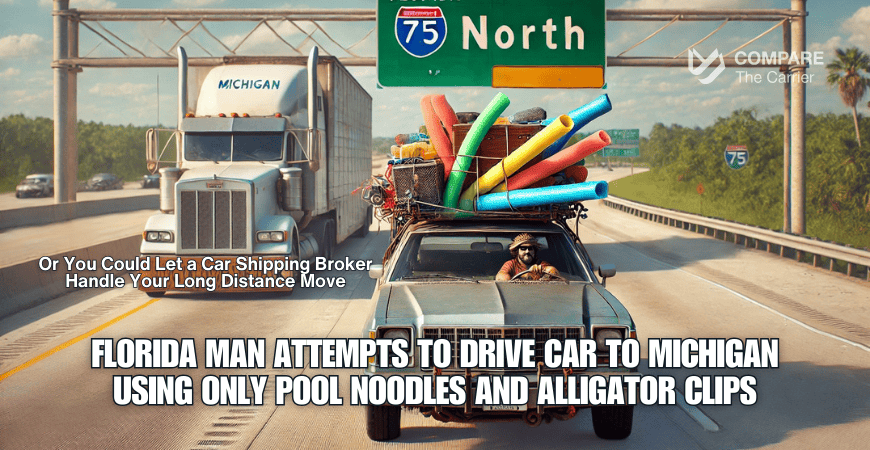
Florida Man Could Try This…
…Or You Could Let a Car Shipping Broker Handle Your Florida to Michigan Transport.
Here’s why partnering with a broker for your Florida to Michigan car shipping needs can be a game-changer:
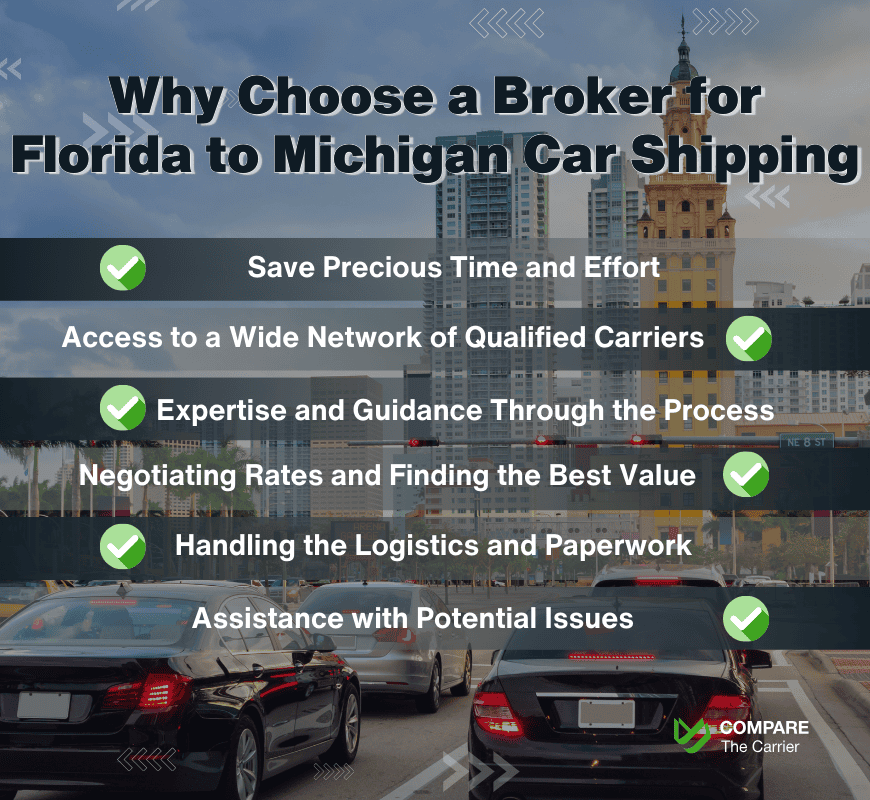
Think of it this way: you wouldn’t necessarily call every airline to find the best flight deal; you might use a travel agent. Similarly, for a hassle-free experience when you ship a car from Florida to Michigan, an auto transport broker can be your best ally.
Additionally, shipping can be a smart choice for car buyers or sellers. If you purchased a vehicle located in Florida or sold one to someone in Michigan, a car shipping company can move it for you without anyone having to make the long drive. Enthusiasts buying classic or exotic cars also prefer shipping – especially enclosed transport – to ensure the vehicle arrives in pristine condition. In all these scenarios, using an auto transport service is about convenience, safety, and saving time.
The Smart Way to Find Your Florida to Michigan Car Shipping Broker in ’25
Finding the right broker for Florida to Michigan car shipping in 2026 doesn’t have to be a shot in the dark. Anyone moving within the Sunshine State can also benefit from our Florida auto transport guide, which delves into in-state shipping requirements and tips.
Here’s a smart approach to ensure you partner with a reliable and trustworthy professional:
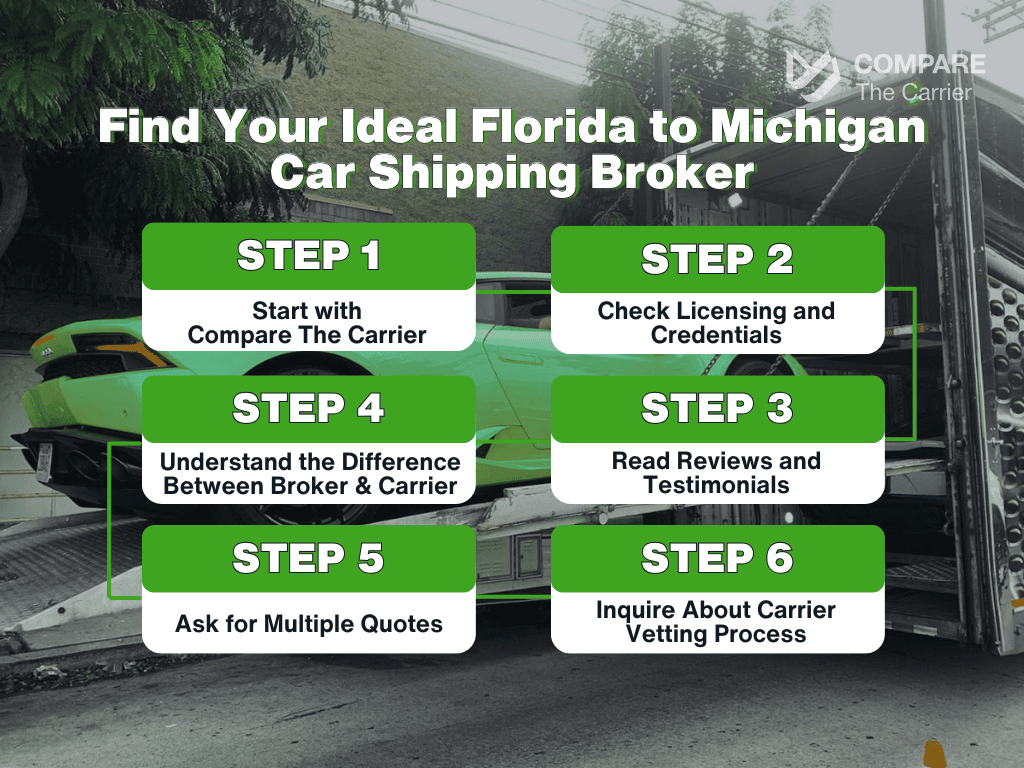
Cost to Ship a Car from Florida to Michigan
One of the first questions you likely have is: How much does it cost?
The price to ship car from Florida to Michigan can vary based on several factors, but we can outline typical ranges. On average, shipping a standard sedan on an open carrier from Florida to Michigan costs about $800 to $1,500. This wide range accounts for variables like the exact distance, the time of year, and fuel prices.8
If you’re shipping a larger vehicle like an SUV or pickup truck, expect to pay a bit more – larger/heavier vehicles incur higher fees (often an extra $100-$200). For example, Michigan car shipping cost estimates usually show that a compact car will cost less than a large SUV on the same route.
If you require enclosed transport for a luxury or classic car, the cost will be higher. Enclosed shipments from FL to MI typically run around $1,200 to $2,500 due to the added protection.
To give you a better idea, here’s a comparison table of estimated shipping costs by vehicle type and transport method for a Florida-to-Michigan move:
Vehicle Type | Open Transport | Enclosed Transport |
Compact Car (Sedan) | $800 – $1,100 | $1,200 – $1,600 |
Mid-size/Full-size Car | $900 – $1,300 | $1,300 – $1,900 |
SUV / Truck | $1,000 – $1,500 | $1,500 – $2,200 |
Note: These figures are illustrative averages for a 1,100–1,300 mile shipment. Actual quotes may vary. It’s always best to get a customized quote for your specific pickup and drop-off locations.
Through Compare The Carrier, you can easily request quotes from multiple vetted shippers at once – allowing you to see prices side by side and pick the best deal.
Factors that affect the long distance car shipping cost:
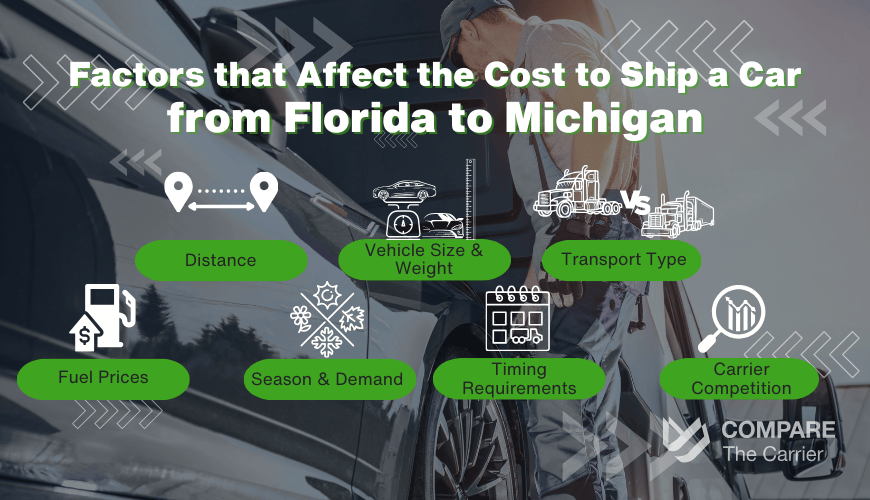
Lastly, always look at what the quote includes. A reputable carrier’s quote will include all basic fees (tolls, insurance coverage for the transport, etc.). Be cautious of quotes that are dramatically lower than others – if one price seems too good to be true, the company might be cutting corners or could be a bait-and-switch scenario. Stick with well-reviewed, FMCSA-registered carriers (you can verify a carrier’s USDOT number and insurance on the FMCSA website and use Compare The Carrier to find quality options at fair prices.
What’s the Timeline for Michigan to Florida Auto Transport via a Broker? (and Vice Versa)

How long will it take to transport your vehicle?
The transit time can vary, but generally, you can expect about 3 to 5 days in transit for this route. The distance (around 1,300 miles) typically means a truck will spend a few days on the road. Carriers often cover roughly 400-500 miles per day.
However, keep in mind that most transports aren’t non-stop straight shots – the driver will likely have multiple pickups or drop-offs along the way, which can add a bit of time. You can also consider door-to-door vs. terminal shipping. They also must adhere to driver hours-of-service regulations (limiting how many hours they can drive each day for safety).
Other factors that can affect the timeline include weather and traffic. For example, if you’re shipping in the winter, sudden snow or ice storms in the Midwest could cause brief delays on I-75. Generally, though, Michigan car shipping companies plan efficient routes and schedule buffers to account for normal delays.
When you book, the auto transport company will typically give you an estimated delivery window. Many deliveries actually happen on the earlier side of the window if all goes smoothly.
Pro tip: Don’t plan something like a flight or a moving appointment for the exact same hour your car is supposed to arrive – give yourself a cushion on either side of the estimated date.
And if timing is critical, you may need expedited auto transport services, which prioritize your vehicle to meet tighter deadlines.
The good news is that Florida to Michigan is a well-traveled corridor, and drivers are very familiar with the route. So, transit is usually efficient. If timing is critical (perhaps you’re flying in to Michigan and need the car by a certain date), discuss options for expedited shipping or a smaller carrier load with your chosen company. Otherwise, just plan on about a week from the day of pickup to be safe. And remember, you can always stay in contact with the carrier during the trip – communication is key, and reputable carriers will keep you updated on their progress.
Tips for a Smooth Car Shipping Experience
To ensure your shipment goes off without a hitch, follow these best practices. Preparation and communication are crucial. Use this checklist to get your vehicle ready and to protect yourself throughout the process:
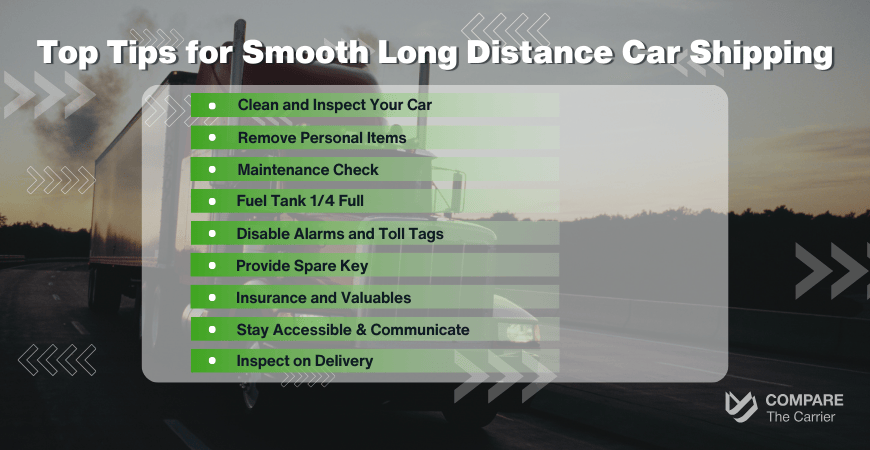
By following these tips, you’re covering all the bases. Thousands of vehicles are shipped using Michigan car shipping services every year successfully. With proper prep and a trustworthy carrier, your car will be one of them.
Conclusion: Your Car’s Journey from Florida to Michigan Starts Here

Shipping your car from Florida to Michigan doesn’t have to be a headache. Honestly, once you have a handle on the costs and timeline, the secret to a smooth trip is just finding a broker you can trust.
A good broker handles the heavy lifting, connecting you with reliable drivers so you don’t have to stress over the details. Whether you’re a snowbird heading back north, moving for school, or starting a new job, Compare The Carrier is here to help you navigate the process.
We make it simple to compare quotes from licensed pros so you can find the right fit for your budget. So, save yourself the exhaustion of that long drive and get your car there the smart way.
FAQ
How far is Florida from Michigan?
The driving distance between Florida and Michigan is approximately 1,200 to 1,400 miles, depending on the specific starting and ending cities. While some choose to travel from Florida to Michigan by car, it involves roughly 20 to 24 hours of driving time, plus costs for gas, hotels, and food. Shipping your vehicle saves you from this wear and tear and allows you to fly to your destination in just a few hours.
How much does it cost to ship a car from Florida to Michigan?
The cost typically ranges from around $800 up to $1,500 for a standard car via open transport on this route. The price depends on factors like the exact distance, your vehicle type, the time of year, and the transport method. If you choose enclosed transport (for a luxury or classic car), it will cost more – usually between $1,200 and $2,500 for the Florida to Michigan trip. It’s best to get a personalized quote; you can use Compare The Carrier to request multiple quotes and see current pricing.
How does vehicle transport from Florida to Michigan work?
It’s actually pretty straightforward. Once you book a spot, a truck driver meets you in Florida to load your car onto a trailer. They drive it north which usually takes about 3 to 5 days and meet you at your destination in Michigan to hand the keys back. You don’t have to do much other than have the car ready for pickup.
What factors affect the cost to ship a car?
The main things are how far you’re going and how big your vehicle is shipping a large truck obviously costs more than a small sedan. Other big factors include the time of year (prices change during “snowbird” season), current gas prices, and whether you choose an open trailer or the more expensive enclosed option.
Should I choose open or enclosed transport for my car?
For most standard vehicles, open transport is the recommended choice because it’s far cheaper and still very safe. If you have a high-value car, like a classic collector car or an expensive luxury car you might opt for enclosed transport despite the higher cost to ensure it’s completely protected from weather or road debris.








![Most Popular Methods Of Cross Country Car Shipping [2026 Update] 16 16 cross country auto transport](https://comparethecarrier.com/wp-content/uploads/2022/03/Most-Popular-Methods-Of-Cross-Country-Car-Shipping-340x200.jpg)








